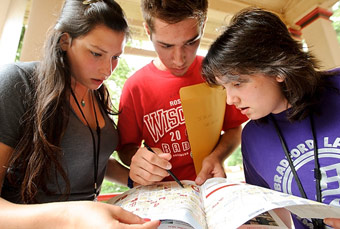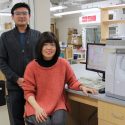“Boot camp” prepares students for biology education at UW-Madison
Here’s the situation: Recently, three kids succumbed within a month to a new blood parasite at your hospital, and a fourth child has just been admitted with the same parasite.

On July 12, 2011, incoming biology freshmen (left to right) Becky Goldberg, Ben Howery and Sara Bolyard consult a campus map as they take part in a Bio Boot Camp scavenger hunt. Bio Boot Camp is a one-week, pre-college experience designed to introduce students to the university and its biology programs.
Photo: Bryce Richter
Biology instructor Jean Heitz is plunging ahead with a discussion of research techniques and priorities at the first edition of Bio Boot Camp, a new effort to acquaint incoming biology students with the rigors of life as a biology undergraduate at the University of Wisconsin–Madison.
Heitz sharpens the issue: “If you had already learned to grow this parasite in culture, what would you do to save the patient’s life?”
The boot-campers in her audience are not shy, and they invent a range of answers: Study the symptoms. Use a transfusion to give the patient more time. Explore how the kids are getting infected.
And figure out how to kill the parasite.
Heitz points out that given the one-month deadline, that the last question is the critical one, and then guides the discussion toward a more detailed formulation of tactics. This exercise, held in the genetics-biotechnology auditorium, is a core component of the boot camp, intended to help student set priorities for their transition into a giant research university where 60 academic departments at least touch on biology.
Funded as part of a $1.4 million grant from the Howard Hughes Medical Institute to the Institute for Biology Education the boot camp ran for three days in July, and will resume with another day and a half just before school starts in late August. Two more annual sessions are also planned.
Teenagers being what they are, much of the focus was not biology, but on meeting fellow biology students.
“I love biology, science and thought it would be really cool to meet people who shared same the interest before we jumped in in the fall,” says Emily Adams of Rogers, Minn. “UW-Madison can be a little intimidating, a bit overwhelming, you don’t know anybody, and making connections with people is essential.”
“This is a great way to get to know people, I am not going to know anybody when I come here, I don’t know the city,” says Aidee Guzman, from California’s Central Valley, who plans to major in food science as preparation for organic farming.
During a “speed dating” session, about a dozen professors from around campus held 15-minute discussions with a handful of students. That is the approach that may help students like Kevin Krieg of Shorewood, Wis., who says, “I wasn’t really sure what I wanted to do with biology, and thought this would be a good way to learn about campus, meet some people, and decide if I really want go into biology.”
During another session, Janet Branchaw, interim director of the biology education institute, sketched a picture of the research university, explaining that professors have obligations as teachers, researchers and serving the broader society.
“These are scholars who lead research teams that generate new knowledge in their disciplines, and they are busy when they are not in class, working on funding and coordinating research. You must understand how busy they are, and how much they have to offer,” Branchaw says. “They are fountains of knowledge.”
Branchaw profiled five biology undergrads who have been involved in research, suggested how undergraduates can get involved in research on campus, and stressed that even a routine lab job can be a steppingstone.
“You may be washing glassware or mixing solutions, but the lab leaders are watching you,” she says. “Are you careful? Do you show up on time? Do you keep good records? This is one way to get started in the research side of this institution.”
Tags: biosciences, learning, research



